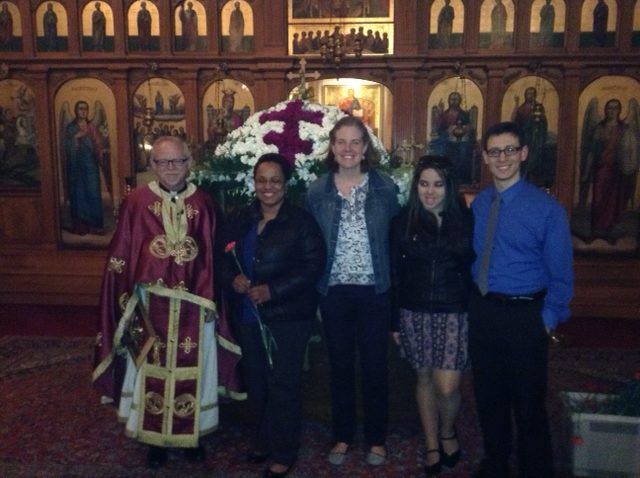 Our blogger this week is Steven Hardy, who is a UniteBoston Rep in the Cambridge/Harvard Square area. Steven attends St. Paul’s Parish and is a self-described “arm chair theologian and historian.” Below, Steven presents some great insights on the unity of the church after attending his first Orthodox liturgy service.
Our blogger this week is Steven Hardy, who is a UniteBoston Rep in the Cambridge/Harvard Square area. Steven attends St. Paul’s Parish and is a self-described “arm chair theologian and historian.” Below, Steven presents some great insights on the unity of the church after attending his first Orthodox liturgy service.
—————
For the first time this year, I decided to attend the Pascha (Easter) celebrations at an Orthodox church. A group of us from UniteBoston had participated in the Good Friday service of Lamentations the previous evening, and I felt as though it would be incomplete to lament the crucifixion and burial of Christ with this community, and not celebrate his joyful resurrection with them. Being a Western Christian, I had already undergone the Lenten fast and the Feast of the Resurrection, but one can never mark this great mystery enough, right?

Going into the service, I fully expected the many differences in the Eastern liturgy to stand out. I was eager to experience these differences and ready to make note of them. Basically, I suspected that I would be more of an observer than a participant. However, what drew my attention was the many things I saw that were in common with my own liturgical background. Many of the prayers, verses and responses, and even the placement in the liturgy were the same or very similar to my own background. Some of them were in the very same translations that I’ve known my whole life. As is often the case, my expectations were utterly off base when it comes to the work of God, through the Holy Spirit.
Another thing that I was very conscious of, being at an Antiochian Orthodox Church, was the current strife taking place in Syria. I noticed that, though many were not of Syrian decent, those who are, were at least one generation removed from their immigrant forerunners. The blood of Christian martyrs is being spilled there far too frequently. These Christians martyrs are not just Orthodox, but a mix of denominations. They are being persecuted and murdered due to their shared faith in Christ, causing the blood of Catholic, Orthodox, and Protestant martyrs to be mingled together in union. As Pope Francis told Catholicos Karekin II of Etchmiadzin, the Patriarch of the Armenian Apostolic Church, “Just as in the ancient church the blood of the martyrs became the seed of new Christians, so in our day the blood of many Christians has become the seed of unity.” The Pope was referring to both the Arminian Genocide that took place under the Ottoman Empire 101 years ago, as well as the current state of affairs.
We often use the term brother and sister when referring to Christians of other denominations. I suspect, however, that we often mean something more akin to cousin, or friend. As I witnessed the many things in common with the Orthodox in Cambridge, as I was made to feel welcome at their festive post- liturgy celebrations, and as I thought on the witness of the martyrs, I can’t help but to feel a much closer bond to these people who are indeed my brothers and sisters in Christ.
One day I hope that we can finally remove the things that stand in the way of full union with one another. We have a rich diversity in Christian faith traditions right here in the Greater Boston Area. We share in one Baptism into the living body of Christ on Earth. We all proclaim Christ crucified and risen. I would very much like to celebrate this shared faith together, in full communion so that we can reply with one voice, “truly He is Risen!”

Leave a Reply